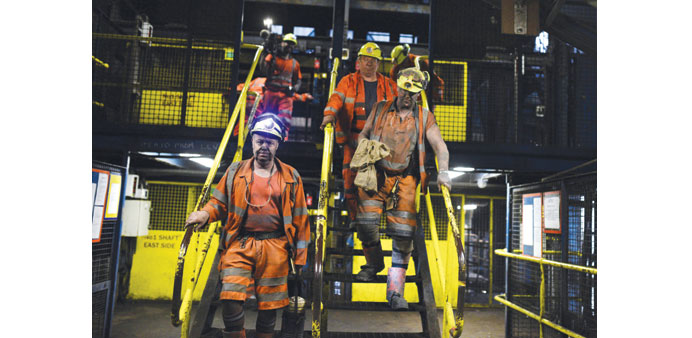Coal miners finish the final shift before closure at the Kellingley Colliery in Yorkshire yesterday.
AFP
London
Miners at Britain’s last remaining deep coal mine worked their final shift yesterday in a historic milestone for what was once one of the country’s most important industries.
At 12.45GMT miners filed out of the Kellingley Colliery in Yorkshire, which employed 450 miners to dig coal out 800 metres (2,600 feet) below ground.
“I thought that I would see out my career here but it is not to be,” coal mine manager Shaun McLoughlin said.
“This is a very sad day for everyone connected with the mine but I am proud that we have done the job safely and professionally,” he said.
Known as the dirtiest fossil fuel, coal has fallen out of fashion as world governments look to limit emissions and switch to clean energy.
The government plans to phase out the most polluting coal power stations by 2025, signalling the end for an industry that fuelled the British empire and the industrial revolution.
“The closure of Kellingley Colliery marks the end of an incredibly significant period in our country’s social and economic history,” said Philip Lawrence, the chief executive of the Coal Authority.
The industry is remembered for the bitter 1980s struggle by miners to stop the Conservative government of Margaret Thatcher shutting their workplaces - a deeply symbolic defeat for the unions that helped usher in the liberal British economy of today.
Like many post-industrial areas of Britain, former coal-mining regions have often struggled to adjust to the new service-driven economy, leading to chronic unemployment.
The Kellingley closure ended a vital source of income in the area around the nearby village of Knottingley, and families have been left questioning their future.
Many of the mine’s employees began work at 15 and fear they may struggle to find other work.
“Some of the miners have already found alternative employment, some of the miners are going to retire, some of the miners are looking for jobs,” McLoughlin told Sky.
“It’s very sad but it’s the economic truth of it.”
The area is surrounded by three coal-fired stations including Drax, which produces between seven and eight percent of Britain’s electricity - but only Drax is set to remain operational after 2016.
Earlier this month, 195 nations sealed a landmark deal to curb greenhouse emissions and limit climate change at a United Nations conference.

